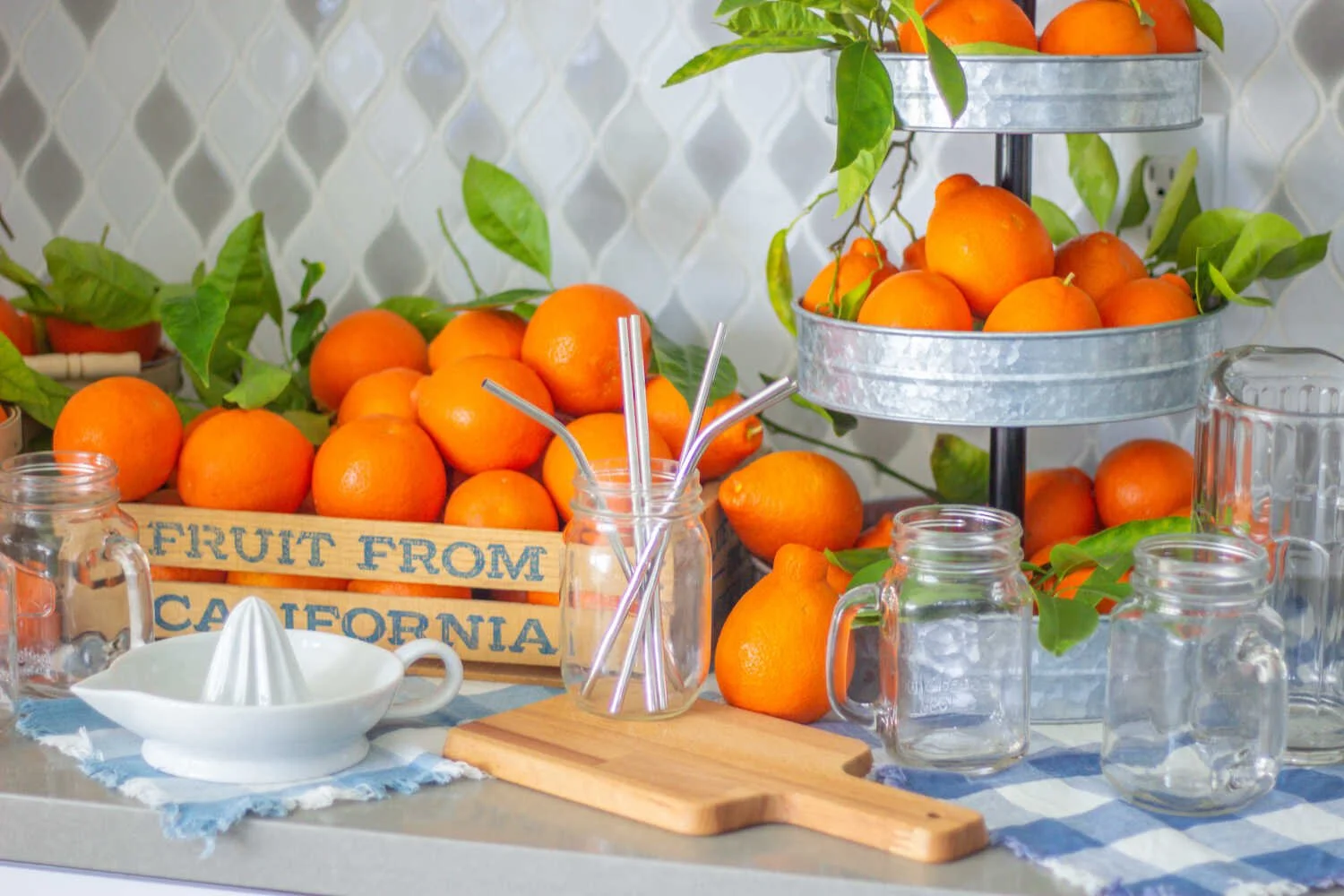Top 10 Ways to Make Your Kitchen More Eco-Friendly
All around the world, many people are trying to go green or live eco-friendly lives to reduce their impact on the environment. As well as helping out the natural world, going green can also provide some personal benefits, such as saving you money and making certain aspects of your day-to-day life easier and more convenient.
There are lots of ways to become more eco-friendly at home, starting off in the kitchen. And it’s not just about eating organic food or cutting down on the amount of waste you create; there are lots of creative and clever ways to minimize your carbon footprint through kitchen cleaning, organization, and general usage. Let’s take a look at some super easy ways to get started.
The Sustainable Kitchen Checklist
Clean the Kitchen with Eco-friendly and Sustainable Products
It’s really important to keep your kitchen clean, wiping away dirt and invisible microbes and bacteria from the various surfaces that you use for food preparation. This not only makes the place look and smell fresher, but also reduces the risks of any contamination in the dishes you make for your family.
An easy way to make your kitchen a more eco-friendly space is to use eco-friendly cleaning products. Environmentally-friendly kitchen cleaners are free of the harsh chemicals that can harm wildlife and poison the air, and you can even use homemade solutions by mixing ingredients like white vinegar, lemon juice and baking soda.
Avoid Deodorizing with Aerosols
One of the issues with kitchens is that they can have quite strong smells, retaining all of the odors of the various meals and ingredients you cook up throughout the day. It's not too pleasant to walk into a kitchen that smells of grease or other undesirable odors, so many people like to use chemical air fresheners to freshen up the air and make the space smell better.
Well, while chemical air fresheners can be very effective, they also emit lots of chemicals and toxins into the air that can be dangerous for you, your family, and your pets. This is why more and more people are opting to get rid of such devices and use safer, natural products instead, like candles, houseplants to purify the air, or essential oils.
Best Brands to Shop for Eco-Friendly Cleaning Products:
Limit Single Use Paper and Plastic Products
Single-use plastic is one of the biggest contributors to pollution across the world, with around 400 million tons of plastic waste produced annually and many single-use items like bags, bottles, wraps, and straws being a large part of that problem.
A great way to live a greener life is to cut down on the amount of single-use plastics you use at home. Instead of disposable plastic food wraps or storage bags, for example, you can swap them out for more eco-friendly alternatives like beeswax wraps and bags. These items are made in sustainable ways and you’ll often be supporting small and eco-friendly businesses.
Opt for Plastic-free Food Storage
It's quite common for people to store leftovers in plastic containers in the fridge or freezer. However, buying and using so much plastic really isn't great for the environment. If you're looking to reduce your plastic usage with a better, greener option, consider investing in some plastic-free containers.
These days, it's easy to find food storage containers made of many different materials, from food-grade silicone to glass and even metal. These products tend to be much better for the environment, easily cleaned and reused over and over again, not to mention more durable for a longer lifespan. If you take good care of them, you won’t have to worry about wasting money on more containers in the future.
Choose Energy Efficient Appliances
When the time comes to upgrade the appliances in your kitchen, you may want to consider investing in more energy efficient models. We use devices like the oven and stove, fridge, freezer, microwave, and dishwasher each day for the likes of food storage, food preparation, and cleaning up our plates, dishes, and utensils after the evening meal. These appliances are really useful, but they also use up a whole lot of energy (and water, in the case of the dishwasher).
When buying a new device, look for the Energy Star rating and think about your family's needs so that you don't overspend on a device that is larger or more powerful than you truly need. You can also look into new technology such as induction cooktops which are so sleek and fast, not to mention eco-friendly because it uses 10% less energy than a smooth-top electric range.
Bonus Tip: When renovating your kitchen space, make sure to safely dispose old appliances in a responsible and eco-friendly manner.
Choose Eco-Friendly Cabinetry Materials For Kitchen
Making your kitchen more eco-friendly isn’t just about choosing energy-efficient appliances to use less electricity or opting for reusable storage containers. It’s also about the materials you choose to use in the kitchen itself, like the materials that make up your kitchen cabinets, countertops, floors and so on.
If you’re looking for a green upgrade, consider using some green materials for your new kitchen cabinets, like recycled glass or sustainable timber. Look at brands like Puustelli and Green Building Supply that make eco-friendly cabinets made without formaldehyde and non-toxic glues.
Bonus Tip: As well as considering the materials of your kitchen cabinets, you might want to take a look at other elements of your kitchen space, from the floors to the walls, and even the windows! Eco-friendly custom window coverings can make your kitchen more attractive and more environmentally kind.
Shop Energy Efficient Appliances:
Recycle and Compost
One of the golden rules for living a green and eco-friendly life is to make sure you recycle as much as possible. Of course, not everything can be recycled, but a lot of things can. It’s important to educate yourself and be aware of what it’s possible to recycle, reuse, or even add to a compost heap, especially when it comes to kitchen waste. A lot of the packaging items left over from food, like cereal boxes and soda cans, can also be recycled, so make sure to dispose of them correctly, rather than simply throwing things into the trash.
The average household can produce quite a lot of food waste, including everything from meal leftovers to fruit and vegetable peels. A lot of those organic items can be added to a compost heap, and you can later use that same compost to fertilize your yard or garden and help things grow.
Shop Urban Composting Solutions:
Be Water Wise
Another must follow protocol of going green is to seriously monitor and control your usage of water. Water is the world's most important resource. It's an essential element of life, and we use so much of it each and every day, especially in the kitchen for cleaning things or cooking certain foods. A whole lot of water also gets wasted in the kitchen, but there are ways to avoid that.
For example, when cleaning the dishes after a meal, try to avoid simply leaving the faucet running all of the time. Fill up the sink or a large bowl and use that to wash up your plates and utensils. Or, when cooking with water, like boiling vegetables, try not to fill the pans too much, and make sure to put a lid on top - this makes the water boil faster and uses less energy. You can also try to limit your reliance on the dishwasher to save many gallons each year.
Be Smarter When Preheating the Oven
Do you preheat your oven for a little while before putting food in to cook? This is a traditional practice that a lot of people still follow, but the truth is that it isn't quite as necessary or relevant as it once was. In fact, today's ovens are much more efficient than those of the past, getting to the desired temperature very quickly.
Because of this, the whole concept of preheating the oven is now somewhat outdated. You don't need to switch on the oven 10 or 15 minutes before you start cooking. In fact, you can usually simply switch it on and then wait just a couple of minutes before putting your ingredients in. Not only that, but if you've been baking something for a while and the oven is already very hot, you can sometimes switch it off just before the end of the cooking time and let the residual heat inside the oven finish off whatever it is that you're cooking.
Choose Only Eco-Friendly Kitchen Items
In the past, it was hard to find eco-friendly items and accessories for your kitchen, as the range of products was quite limited. Fortunately, things have changed a lot, and it’s now much easier to find and buy a broad selection of eco-friendly cooking and kitchen items.
You can find everything from eco-friendly cookie cutters to reusable wooden utensils, recycled glasses, sustainably-made plates, and so much more. Before buying new kitchen items, take a look at how they’re made and try to find brands that use sustainable materials and methods to buy from.

















